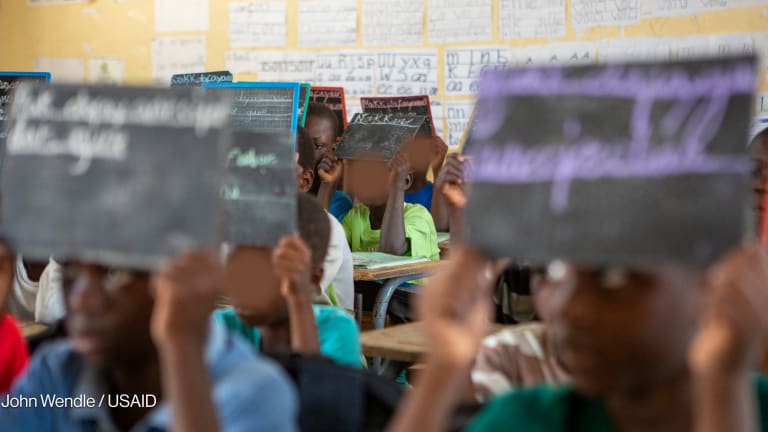
The data are dismal when it comes to learning outcomes in many developing countries — but I’m optimistic. I’m optimistic because I spend much of my day learning about and working with people who are testing innovative education models with the hope of finding something truly transformative.
Right now I’m working with my colleagues at the Center for Education Innovations and our partners at UNICEF to support five education programs that are aiming high. It’s difficult to pinpoint the most exciting part of this work: Is it that these programs are willing to take the risk of shaking things up to redefine what education looks like, with an explicit focus on those that need it most? Or is it that the people making them happen are just as passionate about testing their approaches and learning from the data that they produce as they are about implementing the model?
Luckily, we don’t have to choose between a passion for innovation and a commitment to innovative approaches that are not only new, but also good and always getting better.
making sure that our new approaches are good approaches that are always getting better.
Let’s be honest: While the evidence base is growing, we don’t yet know what models work best to improve learning in developing countries, in general or in a given context. And I’m a firm believer that the “answer” is going to be not one but many solutions that collectively strengthen education systems.
To find those solutions, we need people and programs who are not only willing to try something new, but also to test and adapt and tweak their models continuously for the sake of getting better. Innovation and testing have to go hand in hand; otherwise we will be surrounded by lots of “new” things, but we may not be getting much closer to things that work to improve learning on the scale that’s needed.
Here’s what you should know about the five programs and how they’re testing the effectiveness of their approaches:
This pilot project gives children — many of whom have never before attended school — access to Sudan’s grade one math curriculum through a self-guided, gamified math course on tablets, which are powered by solar power stations. Children use the tablets in existing community spaces, with the facilitation of trained community members.
Roughly 600 children in 30 communities are involved in the 2014-2015 pilot. War Child Holland and UNICEF Sudan are partnering to implement the pilot and are conducting research on math learning outcomes, socio-emotional outcomes, technology logistics and cost-effectiveness.
Accelerated School Readiness (Ethiopia)
This pilot project trains current grade one teachers in government schools to teach an accelerated two-month school readiness program to 5-year-olds before they enter grade one.
Two models are being piloted: a summer school approach and an approach that replaces the first two months of grade one with the accelerated program. The 2015 pilot is expected to reach roughly 9,000 children in 180 schools.
UNICEF Ethiopia is implementing the program in partnership with the government of Ethiopia. Research efforts include a randomized evaluation of school readiness levels by American Institutes for Research as well as a cost-effectiveness analysis.
This mature program began in 2009 in Brazil’s Piauí state and has since reached 224 municipalities. A combination of student-centered curriculum development, teacher training, parental engagement, and assessment is used to ensure basic literacy for all children by the end of grade three.
A partnership with UNICEF Brazil, the government of Brazil and two regional NGOs, Palavra de Criança is currently being adapted for rollout in 2015 in 14 municipalities in Amazonas state, where some of Brazil’s most marginalized and hard-to-reach children are located.
Case studies are being planned to systematically document the process of adaptation and scaling up, including lessons learned from the first five years of evolutionary program design.
EduTrac Peru is a pilot project that uses the text messaging technology to gather data about schools with the goal of enabling information-based decision-making at national and local levels. It is a partnership of UNICEF Peru and the Peruvian Ministry of Education.
Principals, students, tutors and parent committees will send data into a central system using their mobile phones according to a predetermined schedule; data monitored will initially include teacher and student attendance, timely delivery of education materials, and infrastructure maintenance.
In total, 60 schools in one Andean and one Amazon region of Peru will be included in the 2015 pilot. As the pilot gets underway, a baseline evaluation will be conducted with plans for an outcome evaluation later this year.
In 50 communities in the northern and upper east regions of Ghana, kindergarten teachers and mothers are trained together on how to facilitate play-based learning activities for young children. The mothers serve as volunteers in kindergarten classrooms, lowering the adult-child ratio and, together with teachers, leading small groups in play-based activities using simple locally available materials.
Lively Minds, the NGO that facilitates the training and support of the play schemes, is doing internal pre-post evaluation of not only school-readiness levels of children but also of the knowledge and behaviors of mothers and teachers. An outcome evaluation is currently being designed and will be carried out later this year.
You can see that these are ideas to write home about. They’re closing the gap between home and school, redefining school altogether, and making sure that children are learning in a way that is developmentally appropriate and will set them up for success.
Early data show that these programs have serious potential. But we don’t yet know how well they work or if they can be adapted and scaled successfully. That’s what we’re working to find out.
I’m willing to bet that by testing and adapting and making sure that each model uses evidence to inform its growth, these five programs could well be part of the solution we’re looking for.
You can help shape our coverage on global development innovations by emailing gdb@devex.com or tweeting #innov8aid.








